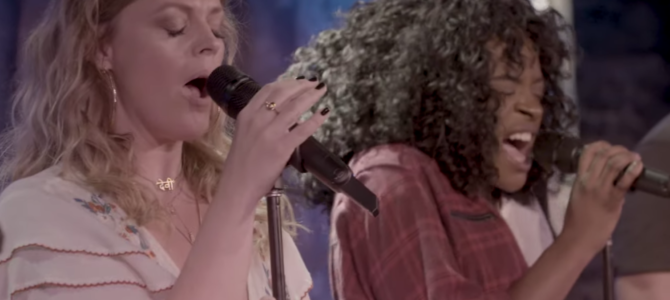
I didn’t listen to “Jagged Little Pill” when it first came out in 1995. That was the year I checked out from decent society, lived in a slanted, buggy apartment next to an illegal brothel on 16th and South Streets in Philadelphia, and spent most of the time I wasn’t working zoned out listening to the Cocteau Twins and Miles Davis. I heard most of the tracks from Alanis Morissette’s iconic album as they played from the open windows of cars paused at stop lights outside my favorite coffee shop, The Last Drop.
Still, when the chance came to see the new musical “Jagged Little Pill,” just opened at the Broadhurst Theater in New York, I was excited. Somehow I knew all the songs without ever really having paid attention to them. I wanted to love this show.
Morissette’s album tells its own story that now, 25 years on, is just as compelling and thrilling as it was for the kids who heard it back then. Without much narrative, it carries the emotional journey of anger and loss, of a kid breaking into adulthood armed with a sledge hammer, a melodic scream, and the weight of family expectations.
In talking to my friend who saw the show with me, I learned this record saw my friend through some heavy emotional turmoil, that being able to sing along to songs about desperation and rebirth gave her power she needed at that time in her life. I was 20 when “Jagged Little Pill” came out, the same age Morissette was at the time, and anger was ripping me apart too.
A Vehicle for Social Activism
That’s the kind of story I was expecting when I handed over my ticket and was directed to my seat: Something about a headstrong, heartbroken girl who finds strength and courage to pick up the pieces, mend them like kintsugi, and move on stronger and somehow still more fragile than before.
Instead, writer Diablo Cody’s book transformed the songs into the story of a wealthy, suburban Connecticut family: an opioid-addicted mother (Elizabeth Stanley), a workaholic dad (Sean Allan Krill), a perfect son who is stressing at the edges of those expectations (Derek Klena), and an adopted daughter who doesn’t feel seen (Celia Rose Gooding). The story of the tough but vulnerable cool girl who gives no f-cks about what other people think is a subplot, taken on by the exceptional Lauren Patten, who plays the daughter’s girlfriend, Jo.
Patten’s rendition of “You Oughta Know” in the second act, which she sings to her runaway girlfriend who cheated on her with a guy and now needs to be rescued, is show stealing. Every time Jo was on stage, I couldn’t help but feel it was her story I wanted more of.
Her overly Christian mother disapproves of her look and sexual orientation. Jo falls in love, gets her heart broken, and still comes through for the woman she loves. Meanwhile, we’re absorbed in several family dramas about past traumas and their effects on these seemingly perfect lives. While the performances were strong and the music as powerful as ever, the stories felt like vehicles for the issues Cody wanted to address.
In a recent New York Times interview, Cody was asked about how she came up with the story. “I’ve watched a lot of jukebox musicals,” she said, “since being hired to write this one. There are some that I watch and I think, ‘How did the writer do this? These songs are inane. You really have to be a genius to figure out how to work this into a narrative.’ Whereas ‘Jagged Little Pill’ was a cinch. You listen to that album: It is cinematic. The songs are telling stories. … People always think about ‘You Oughta Know,’ but that song is kind of an anomaly, actually. It’s like the one aggressive song on the album, and everything else is about wanting to be seen by her family, wanting to be recognized as this artist and spiritual person.”
Cody talks about making Frankie, the young daughter of the family, an activist:
It just seemed impossible to tell a modern story about activism and empathy and not acknowledge the climate emergency, not acknowledge mass shootings, not acknowledge racial tensions, not acknowledge sexual assault. I know there are some people who feel that there might be too many issues in this show, and that’s fine with me. That makes me want to pile on more, because the reality is there are too many issues in the world.
‘Jagged Little Pill’ Covers Too Many Issues
One issue that didn’t make the cut is Jo dealing with gender identity issues. Apparently, it has been rumored Jo was originally meant to be trans, when the show ran at A.R.T. in Boston. Cody dispels that gossip, but in doing so, she said, “I don’t want anyone to feel excluded, hurt, triggered by this show. I want people to come and feel good about it. I know that I can’t please everybody, but, you know, we have so many experts involved. We have like an entire task force dealing with this issue. So I just have to listen to them, keep my own mouth shut. I’m not on any kind of gender journey. Aside from being a boring -ss cis lady.”
Although Cody is fine with people thinking the show covers too many issues, the show does, in fact, cover too many issues. It’s a mistake to think an issue needs to be explicitly stated for it to have an effect. If the goal of the show is empathy, the audience doesn’t need a list of all the items about which they should be empathetic. It’s enough to show compassion, forgiveness, empathy, and understanding. The issues are not as important one by one as is the overarching concept of kindness.
With so many storylines — the addiction, the breaking marriage, a rape at a sporty high school party (complete with protests when the girl isn’t believed), a runaway, a couple broken hearts, first sexual experiences, a fentanyl overdose, a porn addiction, and a few Christmases thrown in — it’s hard to keep track of all the plots, and even harder to feel invested in any of them.
Musicals don’t have much room for story development. In a musical, stories must develop along with character, tone, and style through the music. The songs from “Jagged Little Pill” are used, in many cases, to describe the feelings that go along with the story, as opposed to propelling the story. Several of the songs are compelled to do double duty in pushing too many plots at once.
‘Jagged Little Pill’ Direction and Design
While none of the stories bring enough depth for a true connection, the music makes up for all of that. The opening number, “Right Through You,” is a bit jarring because it’s a full-on ensemble dance sequence — but it isn’t about anything yet. We have no idea what the story could be, who the main character is, or what’s at stake, but flannel-clad bodies fly across the stage anyway.
It’s a 1990s nostalgic fantasy sequence showing the fashion and feeling of the time. It takes until the end of the first act, with the song “Forgiven,” for the show to begin coming together.
The direction is clunky and weird, giving the feeling of a high school musical-style performance through its presentational nature. Intimate moments were lacking despite the forced melodic duets. The choreography was amazingly expressive, and the ensemble was vibrant and precise in its movements.
The design was also strange. Large flats rolled about to create different settings, with projections on them to signify locations such as a classroom or church. When they were not glazed with signifying images, they were simply flats covered with siding. The effect was Home Depot with some neon lights thrown in.
Call me old fashioned, but on a Broadway stage, I don’t want to see a simple set, or, as we often saw in “Jagged Little Pill,” the brick back of the stage wall. The bare-bones approach in direction and design is great for a downtown show, but here it contributed to the underwhelming feeling of the show as a whole.
It seems the creators overthought the show. What I really wanted to see was the headstrong, heartbroken, cool girl who screamed out all her pain and trauma, wore catharsis on her sleeve, and gave us the passionate-young-woman-on-the-verge-of-adulthood vibe that the album does. The creators didn’t want to make this a memoir-style show, an Alanis bio-musical, and that’s fine. But it was impersonal, dogmatic in its social justice approach, and alienating.
I wanted this show to be epic, to bring that feeling only theater can bring — of belonging, tension, and emotion. Despite the story not really holding together, many surprisingly emotional moments shone through. This is entirely because of the album “Jagged Little Pill,” which will hold together far longer than this issue-driven collection of stories. It already has.









